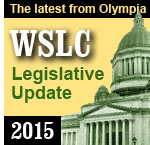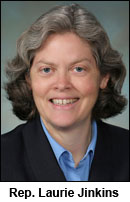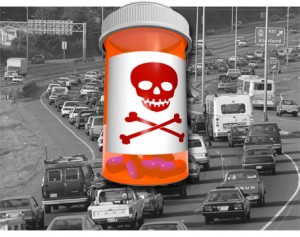STATE GOVERNMENT
Legislative Update: Dismantling of workers’ compensation
Safety net for injured workers targeted by big business in state, across nation

 Today’s edition of the WSLC Legislative Update newsletter:
Today’s edition of the WSLC Legislative Update newsletter:
OLYMPIA (March 5, 2015) — This week, ProPublica and NPR reported the results of a ground-breaking national investigation into the systematic destruction of the safety net for workers injured on the job, which they found has been “steered by big business and aided by the recent Republican takeovers of state legislatures.”
“Over the past decade, state after state has been dismantling America’s workers’ comp system with disastrous consequences for many of the hundreds of thousands of people who suffer serious injuries at work each year,” the investigation found. “The cutbacks have been so drastic in some places that they virtually guarantee injured workers will plummet into poverty. Workers often battle insurance companies for years to get the surgeries, prescriptions and basic help their doctors recommend.”
Washington’s state-run workers’ compensation system has not been immune from such cutbacks. Just months after voters overwhelmingly rejected a business-funded 2010 initiative to privatize our system, corporate lobbying groups aggressively sought “reforms.” They pointed to the system’s recession-depleted reserve funds and predicted dramatic rate increases and job losses unless the legislature significantly cut the system’s costs.
The result in 2011 was a series of bills supported by both business and labor to help injured workers return to work sooner, changes that saved the system more than $1 billion. But one controversial “reform,” aggressively opposed by labor, allows employers to negotiate lump-sum buyouts with older injured workers for less than what they would otherwise receive. Legislators, including many Democrats, were sold on the idea by dramatic projected savings that have never materialized.
 Since 2011, even as system reserves have recovered and rates have stabilized, business lobbyists have continued to seek benefit cuts, eligibility restrictions, and an expansion of those buyouts.
Since 2011, even as system reserves have recovered and rates have stabilized, business lobbyists have continued to seek benefit cuts, eligibility restrictions, and an expansion of those buyouts.
The 2015 session is no exception. With solidified Republican control of the Senate, there are more such bills than ever:
► Occupational Disease (SB 5509) — Radically redefining occupational disease with a new four-part test that gives employers near immunity for any illnesses/conditions that can be partially blamed on non-work activities, and dramatically restricting the time frame for filing claims.
► Wage simplification (SB 5510) — “Simplifying” benefit calculations by cutting and capping them. Plus, nixing a unanimous Supreme Court decision requiring that the value of health benefits be included in those calculations.
► Undermining Tobin (SB 5508) — Overturning a Supreme Court decision in the Tobin case. The bill would allow employers and the state to confiscate percentages of injured workers’ (and their survivors’) court awards for pain-and-suffering in wrongful death and other cases.
► Group Self-Insurance (SB 5331) — Legalizing the risky practice of multiple employers banding together to self-insure. In other states, such groups have become insolvent and passed major costs onto other employers and/or abandoned injured workers.
► Reporting Injuries (SB 5576) — Dramatically shortening the statute of limitations for filing claims and requiring that claims be filed with the employer, which opens the door to intimidation to discourage claims.
► “Three-Way” (SB 5420) — Allowing the private sale of industrial insurance, a concept overwhelmingly rejected by voters in 2010. That initiative failed in every county — red and blue.
► Structured Settlements (SB 5513) — Lowering the age limit for lump-sum buyouts from 50 to 18.
All of these bills — which are in Senate Rules and could get floor votes at any time — aim to cut employers’ rates in our already relatively inexpensive system by having fewer injured workers qualify for benefits and cutting the benefits for those who do. The end result: more and more debilitated workers wind up living in poverty and on public assistance.
As this week’s NPR report concludes, “Employers have found someone else to foot the bill for workplace accidents: American taxpayers, who shell out tens of billions of dollars a year through Social Security Disability Insurance, Medicare and Medicaid for lost wages and medical costs not covered by workers’ comp.”
House passes minimum wage, paid sick leave bills
We learned two important things on Tuesday:
1) Democratic state representatives believe that people who earn the lowest legal wage in Washington deserve a raise and shouldn’t have to sacrifice their paycheck every time they or their kids get sick.
2) Republican state representatives really, really… really… don’t like either of those ideas.
The House voted on strict party lines, 51-46 — twice — to approve HB 1355, increasing the state’s minimum wage to $12/hour over four years and HB 1356 to allow all workers to earn paid sick days. But not before debating more than a dozen amendments by Republicans to restrict both policies or exempt various workers — teens, farm workers, “trainees,” tipped workers, etc. One amendment would have repealed minimum wage increases approved in Seattle, SeaTac and any other city, county or port district. Those amendments were all rejected.
 “The vast majority of people at that bottom economic rung are adults, the majority of whom are women and some of whom have children” said HB 1355 sponsor Rep. Jessyn Farrell (D-Seattle). “This has an impact on people who are trying hard to make ends meet… (and) when you give people who are earning minimum wage a raise, those dollars go right back into the economy.”
“The vast majority of people at that bottom economic rung are adults, the majority of whom are women and some of whom have children” said HB 1355 sponsor Rep. Jessyn Farrell (D-Seattle). “This has an impact on people who are trying hard to make ends meet… (and) when you give people who are earning minimum wage a raise, those dollars go right back into the economy.”
 “No mom or dad should be forced to choose between staying home with a sick child and putting food on the table at the end of the month,” said Rep. Laurie Jinkins (D-Tacoma), prime sponsor of HB 1356. “No preschool teacher or grocery store worker should be forced to choose between the threat of losing their job or going to work ill and infecting children or customers. Passing Sick and Safe Leave is common sense, good for public health, good for families and good for the economy.”
“No mom or dad should be forced to choose between staying home with a sick child and putting food on the table at the end of the month,” said Rep. Laurie Jinkins (D-Tacoma), prime sponsor of HB 1356. “No preschool teacher or grocery store worker should be forced to choose between the threat of losing their job or going to work ill and infecting children or customers. Passing Sick and Safe Leave is common sense, good for public health, good for families and good for the economy.”
(Check out “House action on wages, sick leave applauded” here at The Stand for kudos from workers and other legislative and Congressional leaders.)
Both bills now head to the Republican-controlled Senate, where they face opposition but also wariness that the measures are so popular that they could inspire both backlash and ballot initiative. If that happens, past experience and current polling suggest that the public may go even further than these relatively modest proposals.
An ‘unclean’ transportation package
In the other Washington, a shutdown of the Department of Homeland Security was narrowly averted this week. Republicans had initially refused to pass a “clean” funding bill stripped of language intended to block actions by executive branch.
 Sound familiar? In D.C., it was immigration. In Olympia, it’s climate change.
Sound familiar? In D.C., it was immigration. In Olympia, it’s climate change.
Rather than passing a clean transportation funding bill, the Republican-controlled Senate advanced one this week that ties desperately needed transportation revenue to language blocking actions by the governor from regulating carbon emissions.
On the positive side, the Senate did something it hadn’t done in the past two years: vote on a transportation funding package. The $15 billion plan, funded primarily through a 11.7-cent gas tax increase, was approved on a 27-22 vote Tuesday, with seven Democrats joining most Republicans voting “yes” and six Republicans joining most Democrats in voting “no.” The unusual split was the largely the result of Democratic opposition to “poison pills” that kill transit funding if the governor takes any action to reduce carbon emissions over the next 16 years and an all-or-nothing clause that kills the package unless six policy bills, including two relaxing environmental standards, all pass.
“Shackling our state’s hopes for a more reliable, less clogged transportation system to a false ideological choice hampers our ability to make real compromises,” wrote Sen. Pramila Jayapal (D-Seattle) in a column here at The Stand. “We don’t have to choose between clean air and transit.”
Washington State Labor Council President Jeff Johnson echoed those concerns and called on the House to negotiate the removal of divisive, ideological language from the desperately needed package.
“Given our state’s need for improving our transportation infrastructure,” he said, “the WSLC is hopeful that substantive negotiations will take place that result in a clean transportation package that meets our needs for completing key economic corridors; maintaining and preserving our roads, highways, and bridges; improving public safety; increasing funding for transit and multi-modal forms of transportation; and cleaning up our environment, while leaving in place the tools we need as a state to address the disruptive impacts of climate change.”





